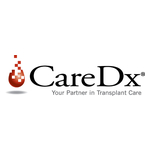First Oral Presentation of OKRA Study Data Highlights CareDx Leadership in Multimodality KidneyCare
Symposium Highlights Power of CareDx Artificial Intelligence Solutions
SOUTH SAN FRANCISCO, Calif.–(BUSINESS WIRE)–CareDx, Inc. (Nasdaq: CDNA) – The Transplant Company™ focused on the discovery, development, and commercialization of clinically differentiated, high-value healthcare solutions for transplant patients and caregivers – today announced a leading presence at the 2022 American Transplant Congress (ATC) with over 50 oral and scientific poster presentations. CareDx will also be sponsoring a symposium, three product theatres, and an Innovation Day session covering the latest innovations in transplantation.1 The ATC meeting takes place June 4-8 in Boston, Massachusetts.
“At CareDx our organizational priority is to the transplant patient and community. This dedicated, 100 percent commitment to transplantation is reflected in the record-breaking number of abstracts presented at ATC this year. I am particularly proud of our first oral presentation of OKRA study results, with data from over 50 centers, highlighting the value of our multimodality KidneyCare solution, including AlloSure, AlloMap, and AI-based tools,” said Reg Seeto, CEO and President of CareDx.
CareDx Product Theatres – Theatre A, Exhibit Hall C:
-
The Predictive Power of AlloSure® Kidney and AiKidney™,
Sunday, June 5, 9:30–10:00 am ET
-
Shifting the Paradigm from Observation to Intervention: The Future of HeartCare,
Monday, June 6, 3:00-3:30pm ET
-
CareDx & KDIGO: Outcomes from the Challenging Allograft Consensus Conference,
Tuesday, June 7, 9:30-10:00am ET
CareDx Lunch Symposium:
- A Window to a New World: Multi-Modality Molecular Characterization & Prediction of Allograft Outcomes, Tuesday, June 7, 12:45 – 1:45pm ET
“I am excited to see the latest findings from the OKRA study showing the additive value of multimodal assessments using CareDx’s AlloSure, AlloMap, and AI-enabled algorithms to gain more comprehensive information about a patient’s allograft health and the likelihood of rejection. Having this information can help inform clinical management decisions for earlier interventions or modulating immunosuppression,” said Amishi Desai, DO, Associate Professor, Medical Director of Kidney and Pancreas Transplantation and Division Chief of Transplant Nephrology, Loyola University.
For a detailed agenda for the product theatres and lunch symposium, please go to the CareDx website and follow this link.
CareDx Innovation Day:
- Artificial Intelligence in Transplantation and CareDx Clinical Pipeline, Tuesday, June 7, 2:00 -3:00pm ET. The event will be held in a hybrid format to enable a wide audience to participate. To learn more and sign up, register here.
Scientific Abstracts:
|
Abstract Titles |
|
Pan Organ: AlloCare |
|
Technology Enabled And Molecular Monitoring Of The Allograft And Transplant Recipient Study |
|
Other Applications |
|
COVID-19 In Solid Organ Transplant: A Global Perspective |
|
Impact of COVID-19 on Transplant Professionalism |
|
Circulating Donor-Derived Cell-Free DNA: A Novel Non-Invasive Biomarker for Immune Surveillance in Vascularized Composite Allotransplantation |
|
Kidney: KOAR Study Data |
|
Elevated Donor-derived Cell-free DNA (dd-cfDNA) In The Early Post-transplant Period Is Associated With An Increased Incidence Of Adverse Clinical Outcomes In Kidney Transplant Recipients |
|
Acute Tubular Injury And Necrosis Do Not Lead To Meaningful Elevations In Donor-derived Cell-free DNA (dd-cfDNA) |
|
Wide Spectrum Of Molecular Injury Highlights Heterogeneity Of Banff Tubulitis And Interstitial Inflammation Lesions |
|
Enhanced Histological Yield And Actionable Findings When Biopsy Is Guided By Donor-derived Cell-free DNA (dd-cfDNA) |
|
Impact Of The Covid-19 Pandemic On Longitudinal Molecular Surveillance In The KOAR Registry |
|
Longitudinal Analysis Of Donor-derived Cell-free DNA (dd-cfDNA) In En-bloc Kidney Transplantation |
|
Donor-derived Cell-free DNA (dd-cfDNA) For Assessment Of Response After Treatment Of Allograft Rejection |
|
Delta Changes In Donor-derived Cell-free DNA (dd-cfDNA) Complement The Donor Fraction In Kidney Transplant Surveillance |
|
Absolute Quantification of Donor-Derived Cell-Free DNA Does Not Provide Additional Discriminating Power Over Donor-Derived Cell-Free DNA Fraction for Detection of Allograft Rejection. |
|
Kidney |
|
Development and Validation of an Integrative DD-CFDNA System to Predict Allograft Rejection: A Population Based Study |
|
Characterization Of Kidney Allograft Pathology Using The Histomap Gene Expression Profile (gep) And Formalin Fixed Paraffin Embedded (ffpe) Tissue |
|
Utility Of A Holistic Molecular Paradigm For Kidney Biopsy In The Clinic |
|
Donor-derived Cell-free DNA Across the Spectrum of Solid Organ Transplantation |
|
Kinetics of dd-cfDNA in Kidney Transplant Recipients Following Sars-CoV-2 Vaccination Booster Administration |
|
Antibody Response and Molecular Graft Surveillance in Kidney Transplant Recipients Following Sars-CoV-2 Vaccination |
|
Antibody Response and Cellular Phenotyping in Kidney Transplant Recipients Following Sars-CoV-2 Vaccination |
|
Longitudinal Monitoring of Simultaneous Pancreas and Kidney Transplant and Pancreas After Kidney Recipients Using Donor-Derived Cell-Free DNA |
|
Dd-cfdna Correlates With Acute Rejection In The Setting Of Bk Viremia After Kidney Transplantation |
|
Impact of Varying Levels of Normal Range Baseline Donor Derived Cell Free DNA On Medium-term Outcomes Following Kidney Transplantation |
|
Impact of Donor Type, Cold Ischemia Time, and Induction Type on Baseline Donor-Derived Cell-Free DNA in Kidney Transplant Recipients |
|
Donor/Recipient Variabilities and Dd-cfdna Level |
|
Modern Medicine Needs Modern Technology Tools |
|
Can dd-cf DNA Eliminate Unnecessary Biopsies? The Answer is Yes! |
|
Clinical Utility Of Donor-Derived Cell-free DNA During The Period Of Recovery Of Renal Function After Kidney Transplantation |
|
Optimizing Kidney Transplant Immunosuppression Using a Phenotypic Personalized Dosing Model |
|
Racial Differences in the Predictability of Donor-Derived Cell-Free DNA Among Renal Transplant Recipients |
|
A Novel Approach to Non-invasive Multimodality Testing with AlloSure and AlloMap Predicts Microvascular Inflammation with high Accuracy in Kidney Transplant Recipients |
|
Plasma Donor-derived Cell-free DNA Longitudinal Kinetics After Kidney Transplantation In Children |
|
Donor-derived Cell-free DNA As A Biomarker Of T Cell Mediated Rejection In Pediatric Kidney Transplant Patients |
|
Prospective Evaluation Of Donor-Derived Cell-Free DNA (dd-cfDNA) In Monitoring Response To Anti-Rejection Treatment In Kidney Transplant Recipients With Indication Biopsy |
|
Evolution of ddcfDNA During the First Week After Surgery Predicts Renal Function Recovery After Kidney Transplant |
|
Surveillance of Donor-Derived Cell-Free DNA Throughout Treatment of Acute Rejection in Pediatric Renal Transplant Recipients |
|
Establishment And Validation Of A Predictive Model For Differential Rejection Diagnosis By Gene Expression Profiling (GEP) In Renal Allograft Biopsies Using Banff Human Organ Transplant (B-HOT) Gene Panel |
|
BK Polyomavirus Infection is not Associated with a Meaningful Increase in Donor-Derived Cell-Free DNA |
|
Heart |
|
The Use of Donor-Derived Cell-Free DNA in Female and Male Heart Transplant Recipients: A Sex-Specific Analysis of the Surveillance Heartcare Outcomes Registry |
|
Are Changes In Clinical Practice Reflected In Gene Expression Profiling Scores After Heart Transplantation? |
|
Impact Of Donor And Recipient Characteristics On Early Post-transplant Donor-derived Cell-free DNA (dd-cfDNA) Scores |
|
Donor Derived Cell-Free DNA Median and Distribution in Pediatric Heart Transplant Patients |
|
Trajectory Of Donor-derived Cell-free DNA (dd-cfDNA) Complements The Baseline Measurements In Heart Transplant Surveillance For Rejection |
|
The Prevalence And Morbidity Associated With BK Virus In Heart Transplant Recipients |
|
Association Between Allograft Gene Expression And Acute Cellular Rejection Grade In Heart Transplant Recipients |
|
Lung |
|
Dd-cfDNA Varies Among Diagnostics Groups Of Pulmonary AMR |
|
Infection Impacts Dd-cfDNA In Lung Transplant Recipients |
|
The Unique Course Of Dd-cfDNA After Lung Transplant |
|
Surveillance with AlloSure For Allograft Rejection and Infection in Lung Transplant |
|
Pancreas |
|
An Initial Analysis of Baseline Levels of dd-cfDNA After Pancreas Transplantation: A Prospective Study from High-Volume Centers in the United States |
|
Pancreas and Kidney |
|
Longitudinal Monitoring of Simultaneous Pancreas and Kidney Transplant and Pancreas After Kidney Recipients Using Donor-Derived Cell-Free DNA |
|
Liver |
|
Analytical Evaluation and Comparison To STR Of An Accurate And Sensitive Microchimerism Monitoring Tool For Liver Transplant Recipients |
|
Baseline levels and early post-transplant kinetics of donor-derived cell-free DNA following liver transplantation |
For a complete list of ATC abstracts by title and poster presentation date and time, please follow this link.
Note: The product theaters, symposium, and innovation day are not part of the official ATC educational program, and the sessions and content are not endorsed by ATC.
About CareDx – The Transplant Company
CareDx, Inc., headquartered in South San Francisco, California, is a leading precision medicine solutions company focused on the discovery, development and commercialization of clinically differentiated, high-value healthcare solutions for transplant patients and caregivers. CareDx offers testing services, products, and digital healthcare solutions along the pre- and post-transplant patient journey and is the leading provider of genomics-based information for transplant patients. For more information, please visit: www.CareDx.com.
Forward Looking Statements
This press release includes forward-looking statements related to CareDx, Inc., including statements regarding the potential benefits and results that may be achieved with CareDx’s leading presence at the 2022 ATC, including over 50 oral and scientific poster presentations and its sponsorship of a symposium, three product theatres and an Innovation Day session (the “CareDx Transplant Congress Leadership”). These forward-looking statements are based upon information that is currently available to CareDx and its current expectations, speak only as of the date hereof, and are subject to risks and uncertainties that could cause actual results to differ materially from those projected, including risks that CareDx does not realize the expected benefits of the CareDx Transplant Congress Leadership; risks that the findings of the presented studies may not be accurate; risks that 2022 ATC and the agendas of CareDx symposium, product theatres and sessions fail to take place as planned; general economic and market factors; and other risks discussed in CareDx’s filings with the SEC, including the Annual Report on Form 10-K for the fiscal year ended December 31, 2021 filed by CareDx with the SEC on February 24, 2022, the quarterly report on Form 10-Q for the first quarter of 2022 ended on March 31, 2022 filed by CareDx with the SEC on May 5, 2022, and other reports that CareDx has filed with the SEC. Any of these may cause CareDx’s actual results, performance or achievements to differ materially and adversely from those anticipated or implied by CareDx’s forward-looking statements. CareDx expressly disclaims any obligation, except as required by law, or undertaking to update or revise any such forward-looking statements.
References:
1. The product theaters, symposium, and innovation day are not part of the official ATC educational program, and the sessions and content are not endorsed by ATC.
Contacts
CareDx, Inc.
Sasha King
Chief Marketing Officer
415-287-2393
Investor Relations
Ian Cooney
(415) 722-4563



